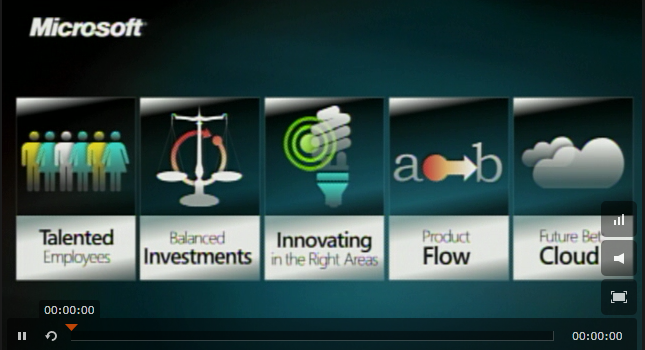Microsoft's Ballmer shares his 'five things that matter'

For a few years running, Microsoft CEO Steve Ballmer made an appearance at the start of every calendar year to provide Wall Street analysts with a "Strategic Update" on Microsoft. He didn't do so this year, but he covered some of the same territory during his keynote address during Microsoft's annual CEO Summit on May 19.
No press were allowed to attend this year's Summit, but Ballmer's keynote (minus the Q&A with the 125 or so CEOs in attendance) was webcast. The title of his talk was "Seizing the Opportunity in the Cloud." But Ballmer didn't reveal anything new about Microsoft's cloud strategy or positioning during his 30-plus-minute talk.
Instead, what I found more interesting was the list Ballmer shared with attendees about "the five things that matter" to him as a CEO of a major tech company. The five (as listed on this slide he showed):

Ballmer said he believed Microsoft had made the appropriate self-corrections so that it is firing on all cylinders in each of these categories. He claimed that Microsoft is winning new college talent 70 percent to 75 percent of the time when it is bidding against its competitors. He said he believed Microsoft also was attracting and placing senior talent in the right proportions and right places.
It was Ballmer's comments about balanced investments, however, that I found most interesting. He mentioned in passing that there's a five-year grace period as to when longer-term investments should begin to kick in and start contributing to the company's bottom line.
(During previous Wall Street Strategic Update appearances, Ballmer said he prioritized his investments around which things would sustain a half billion dollars or more in new margin growth over the next three years. He also said he thought in 10-year increments, when thinking about key company futures.)
Learning how to be patient and see investments through is a virtue, but "patience can't be an excuse for a lack of performance," he said.
Ballmer quoted Jeff (Bezos, the CEO of Amazon.com, I'm assuming), noting that "the worst bets are the bets you don't make." It's key for a CEO to pick the right things in which to invest, and then "rebirth" the company by re-examining every two to three years the company's line up -- considering new products, new lines of business and new approaches.
"You need to be forward-looking enough, but not too forward-looking" when considering where to place your company bets, Ballmer advised the CEOs.
He acknowledged, without getting specific, that sometimes Microsoft has bet on things too far in the future (I'd put WinFS here), but also pooh-poohed the notion that things are happening every six months in the Internet space, and failing to jump on a product or trend quickly will result in failure.
"There's so much we're passing on, even though we have the broadest (product and technology) footprint out there," he said.
Here are a couple of more slides from Ballmer's talk, one showing the product line-up Microsoft will have in place by year-end 2010, and another on what's different, in terms of technology, when it comes to the cloud.
"We're in a hot wave," Ballmer concluded. "It will be a year of unprecedented opportunity for enterprise organizations" in regards to the new product releases in Office, SharePoint, Exchange, SQL Server and other products the company is delivering to market, he said.